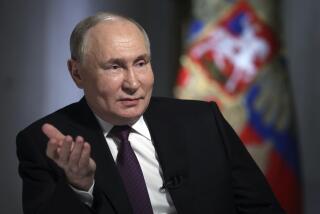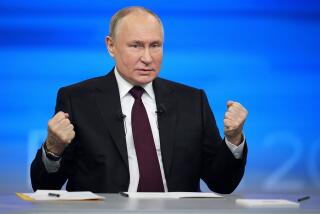Gorbachev Urges A-Plant Warnings : Denounces Reporting on Chernobyl, Extends Nuclear-Test Moratorium
- Share via
MOSCOW — Soviet leader Mikhail S. Gorbachev on Wednesday proposed an international early-warning system for prompt disclosure of nuclear accidents such as the Chernobyl disaster in the Ukraine and extended the life of a unilateral moratorium on nuclear tests until Aug. 6.
In a somber television address that broke his 17-day silence on the April 26 nuclear accident--the world’s worst--Gorbachev said that the death toll has reached nine and that 299 people have been hospitalized for radiation illness.
It is too soon to make a final judgment on what went wrong at the Ukrainian power plant, he said, but he vowed to take any measures needed to ensure that it will not happen again.
While thanking other governments for their sympathy and help, Gorbachev denounced the way the Western media--particularly that of the United States and West Germany--depicted the incident, terming their news coverage “a veritable mountain of lies.”
‘Sinister Force’
“For the first time ever, we encountered in reality such a sinister force as nuclear energy that has escaped control,” he said in his 25-minute address.
Gorbachev offered his public condolences to the families of the dead and others who suffered in the blast, fire and subsequent fallout.
Citing the need for “an international regime of safe development of nuclear power” within the framework of the International Atomic Energy Agency, he called for “a system of prompt warning and supply of information in the event of accidents and faults at nuclear power stations, specifically when this is accompanied by the escape of radioactivity.”
The Soviet Union was widely criticized for withholding news of the Chernobyl accident for nearly three days.
Speedy Assistance
Gorbachev also proposed “an international mechanism . . . for the speediest rendering of mutual assistance” when nuclear accidents occur, plus an international conference, under international agency auspices, to discuss nuclear safety matters.
The Kremlin leader renewed a proposal for a special summit conference with President Reagan in Europe to discuss a nuclear test ban--an idea that was rejected by Reagan when it was first offered last March 29.
As an alternative site, Gorbachev suggested Hiroshima, where the first atomic bomb was dropped in the closing days of World War II.
“The accident at Chernobyl showed again what an abyss will open if nuclear war befalls mankind,” Gorbachev said. “For inherent in the nuclear stockpiles are thousands upon thousands of disasters far more horrible than the Chernobyl one.” As a result, the Soviet government has decided to extend a unilateral moratorium on nuclear tests until Aug. 6, the 41st anniversary of the Hiroshima attack, Gorbachev said.
The moratorium was first put into effect last Aug. 6 and extended until the United States conducted an underground test in early April. At that time, the Soviet Union said it was suspending its moratorium, but it apparently has not conducted any nuclear tests in that interval.
In his report on Chernobyl, Gorbachev said the 12-member ruling Politburo took control over the relief work because the event was so “extraordinary and dangerous.” He defended the 67-hour delay in reporting the accident to the nation and the world, saying: “As soon as we received reliable initial information, it was made available to Soviet people and sent through diplomatic channels to the governments of foreign countries.” The accident occurred at 1:23 a.m. on Saturday, April 26, and was not announced by the Soviet Union until the evening of Monday, April 28.
Protecting the People
Gorbachev said that top priority was placed on protecting the population in the area and providing treatment for those injured in the explosion and fire at Chernobyl, 60 miles north of Kiev, the capital of the Ukraine.
“It is possible to say today that the worst has passed and the most serious consequences have been averted,” Gorbachev said. “Of course, the end is not yet. . . .
“The level of radiation in the station’s zone and on the territory in the immediate vicinity still remains dangerous for human health,” he added.
Extensive steps are being taken to decontaminate the Chernobyl area, Gorbachev said, and they will continue until it is safe.
“All work is being conducted actually on a round-the-clock basis,” he reported, adding that a Politburo group led by Premier Nikolai I. Ryzhkov is in charge of the operation.
Sudden Power Surge
Analyzing the cause of the disaster, Gorbachev said the reactor experienced a sudden power surge during a scheduled maintenance shutdown.
“The considerable emission of steam and subsequent reaction resulted in the formation of hydrogen, its explosion, damage to the reactor and the associated radioactive release,” he said.
“It goes without saying that when the investigation of the causes of the accident is completed, all the necessary conclusions will be drawn and measures will be taken ruling out a repetition of anything of the sort,” he added.
Gorbachev acknowledged that the emergency measures “failed to protect many people” from the effects of the accident.
He named two workers who were killed in the explosion and fire--Vladimir N. Shashenok and Valery I. Khodemchuk--and added that seven others have died from radiation.
‘Profound Condolences’
“On behalf of the Communist Party Central Committee and the Soviet government, I express profound condolences to the families and relatives of the deceased,” Gorbachev said, “to the work collectives, to all who have suffered from this misfortune. The Soviet government will take care of the families of those who died and who suffered.” He praised the rescue workers, medical units and Ukrainian families who welcomed 92,000 people evacuated from the danger zone around the reactor.
Gorbachev expressed thanks for the help offered by other countries, citing by name two American specialists, Dr. Robert P. Gale and Dr. Paul Terasaki, who are helping perform bone marrow transplants on radiation victims in Moscow hospitals.
But he also had strong words for the U.S. and West German governments and mass media in the West.
“Generally speaking, we faced a veritable mountain of lies--most dishonest and malicious lies,” he said.
“It is difficult to imagine what was said and written in those days--’Thousands of Casualties,’ ‘Mass Graves of the Dead,’ ‘Desolate Kiev’ . . . and so on and so forth.
‘Additional Obstacles’
“The ruling circles of the U.S.A. and their most zealous allies--I would like to mention specially the Federal Republic of Germany among them--regarded the mishap only as another possibility to put up additional obstacles holding back the development and deepening of the current East-West dialogue, progressing slowly as it is, and to justify the arms race,” he complained.
Gorbachev said the future of the world economy cannot be envisioned without the continued development of atomic power.
“But it stands to reason that we are all obliged to act with still greater caution,” he said. “Questions of reliability and safety of equipment, the questions of discipline, order and organization assume priority importance.”
More to Read
Sign up for Essential California
The most important California stories and recommendations in your inbox every morning.
You may occasionally receive promotional content from the Los Angeles Times.










